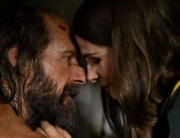The variety show circuit has consistently been accused of being dominated by male writers who don’t make room for a woman’s point of view. Even the well-respected Saturday Night Live was labeled a boy’s club for many years until Tina Fey, beginning in 1997, worked her way up and eventually became its first female head writer. Mindy Kaling is no stranger to this world as someone who broke down barriers: she was the first woman and person of color to write for the U.S. version of The Office. She had also served as an intern on Late Night with Conan O’Brien, so the next logical step was to turn this experience into her comedic debut as a writer and producer.
Emma Thompson plays Katherine Newberry, a strong, nean, and cynical network version of Meryl Streep’s Miranda Priestly in The Devil Wears Prada (2006). She is a pioneer as the only woman ever to host a long-running late-night program. However, her show starts to hit rock bottom when its ratings decline and Katherine is accused of being sexist, because her writers’ room consists entirely of white males. Even Katherine’s supportive husband (John Lithgow) becomes skeptical of the show’s underwhelming content.
Chirpy and determined Molly Patel (Mindy Kaling), who dreams of working for her favorite show, is hired on the spot to fix this problem, and she will have to deal with a toxic environment of over-competitive men, not to mention an office crush. To keep Katherine from being replaced by a younger, hipper male host, Molly strives to revolutionize the program and, in the process, win over her boss, who has a positive change of heart.
Kaling clearly knows what she set out to make, but the cluttered script and too many scenes that should’ve been cut entirely, or at least not extended, hamper the movie, like the dry affair between Molly and her co-worker Charlie (Hugh Dancy), or an out of place, insipid stand-up routine performed by Katherine. What works as humorous, contemporary social commentary is overwhelmed with subplots that suck all the substance from the film and then are thrown out the window like yesterday’s newspaper. It has enough material for a streaming sitcom on Amazon Prime.
One is left leaving the theater with so many questions and points to absorb, but the main one remains: Why was John Lithgow in this movie? His performance is fine, yet his role doesn’t really add much, if anything, to the story. It should’ve stayed in its own supportive corner instead of poorly attempting to grow into a hammy and bizarre bit near the end. More doubts also rush to the viewer’s mind when a work bully magically returns the next day as Molly’s friend. The rest of the men in the writer’s room are pretty much one-dimensional and not affected by Molly.
In casting Thompson, the filmmakers struck gold. She has a riveting presence that you can’t take your eyes away from, and the part is also very fitting for the current American media landscape being overtaken by UK hosts like James Corden, replacing Craig Ferguson on The Late Late Show, and HBO’s John Oliver. With Katherine, Kaling turns the tables and sheds new light on the gender issue, where women can also be held accountable for negative behavior. It’s a welcome and open-minded addition to the conversation. Alas, the rushed undecided rhythm of Late Night makes Katherine’s character transition forced and unbelievable.
What was this movie trying to be anyways, a showbiz exposé or a social romantic comedy?







Leave A Comment